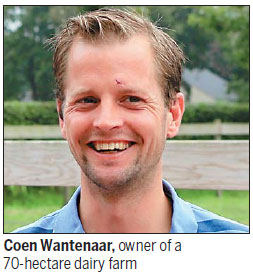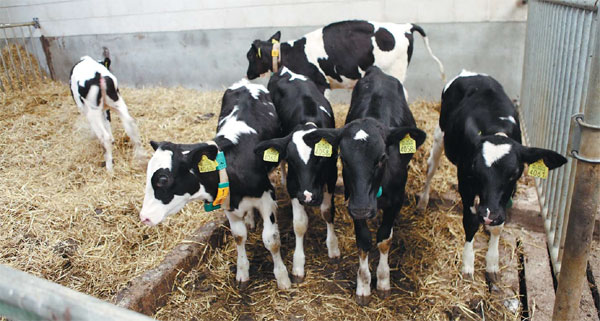Planting a new vision of farming
Updated: 2014-11-21 08:44
By Cecily Liu(China Daily Europe)
|
|||||||||||
Modern Dutch family farms show what China has in mind: efficient, technologically advanced production run by young entrepreneurs
The term "family farm" conjures up for many people a warm, homespun vision of simple country life.
But the modern family farm is specialized, intensive and often a large-scale operation that is run just as efficiently as any successful business.
|
Coen Wantenaar, a 35-year-old owner of a farm in the Netherlands, implements environmentally friendly grazing methods to make sure his cows have a healthy diet. Cecily Liu / China Daily |
Since last year, China has been reforming its agricultural sector through the development of family farms, which engage most members of a single family in production, allowing them to make farming their main source of income.
This initiative could be a game changer that brings the country's agricultural model closer to one already proven successful in developed regions like Europe. It is designed to introduce a sense of entrepreneurial responsibility to average farmers, in turn securing food safety and sustainability.
As in Europe, farming could become a more desirable career path for young and aspiring Chinese rural workers. They would be able to feel proud to make running their family farm a serious and profitable profession.
Recently a group of Chinese food experts and journalists visited one such European farm, a 70-hectare dairy farm that is a part of the Dutch dairy cooperative Royal FrieslandCampina. It was soon clear that this was no rural backwater run on a shoestring.
The farm, which has 150 cows and generates about 40,000 euros of net income a year, is managed by 35-year-old owner Coen Wantenaar, with the help of his parents and just one helper who works one day a week.
Central to the farm is a rotating milking machine that Wantenaar says can milk 20 cows at once. Such automation enables milking to be efficiently done with minimal human labor.
The cows are divided into different age groups, each with its own dietary and nutritional requirements, and daily activities. The farm also has a tank that stores the milk, keeping it cool and fresh prior to collection and quality testing.
Before taking control of the farm, Wantenaar studied at an agricultural school, learning agriculture accountancy and finance. As a smart and aspiring young man, he could have easily taken a different career path, maybe working for a big corporation, but he says his experience growing up on the farm made him fall in love with the farming life.

He then was able to use his knowledge and ideas to improve its operation. The farm was started in the 1950s by his grandfather and initially had 15 cows. This number grew to 35 when his father took charge in 1974, but Wantenaar has transformed the farm's automation technology, and increased its scale and intensity, enabling him to keep 150 cows.
And Wantenaar's understanding of the technical requirements for a sustainable farm led him to implement environmentally friendly grazing methods, make sure the cows have a healthy diet and ensure the freshness of milk during storage.
The industry experts say this is the model for what China's family farms program aspires to create, as it encourages bright and highly educated young workers to remain in the countryside while continuously modernizing technology and introducing sustainable farming measures.
Many of the Chinese experts, visiting a European farm for the first time, were surprised by the efficiency and technology employed on this small-scale family farm, and the attractive financial rewards the farm has generated for the Wantenaar family.
Several say they were impressed by Wantenaar's professional farming knowledge, adding that the training support that FrieslandCampina has given its 14,400 member farms in the Netherlands is a great lesson that can be adapted for China.
However, employing the Western model of the family farm is not easy because it takes time for farmers to build up an understanding of sustainability and responsibility, says Jiang Yujun, chairman of the National Center for Dairy Quality Supervision and Inspection.
Jiang says that China's regulations on dairy food safety are now world leading and so is its dairy processing equipment, but the mindset and education level of farmers still need to improve. That's why retaining well-educated young people to work on family farms is so important.
As a concept, family farms already are popular in many advanced countries and regions, including the United States, Europe, Australia and Japan. In the US, for example, family farms account for almost 96 percent of the total of 2.2 million farms, according to the US Department of Agriculture.
In China, many farms in the past have struggled with low and unstable income, as well difficulty in securing skilled workers. Farmers' children typically aspire to work in factories for better pay.
But this is likely to change with the growth of family farms. As of the end of 2013, China already had 870,000 family farms - run by one family that derives its primary income from agriculture - each with more than 81 hectares of land.
Currently there are about 200 million rural families in China, but this figure is expected to fall to 100 million when the family farm structure matures, with around 50 percent of rural families moving to the cities. That would leave the remaining farmers with more land to work with.
China's initiative to encourage family farms started in February 2013. New government policies to encourage family farms range from measures to accelerate rural land transfers, granting of higher subsidies to large-scale landholders, and encouragement to establish bigger, specialized farming units.
The measures are meant to accelerate radical changes to China's agricultural sector, which, like farms in Europe, could become a more stable and long-term supplier of quality, sustainable food for the nation. At the same time, Chinese farmers, while fewer in number, would become much more prosperous, like their counterparts in advanced economies.
cecily.liu@chinadaily.com.cn
(China Daily European Weekly 11/21/2014 page19)
Today's Top News
China wants its voice heard in cyberspace
New standards set for air purifiers
Alipay brings the frenzy of Black Friday to China
US violates China sovereignty in HK
Cyber terrorism sparks Internet debate
Editorial: Mob politics rocks HK
UnionPay offers discounts to outbound tourists
Palace Museum opens door to special groups for free
Hot Topics
Lunar probe , China growth forecasts, Emission rules get tougher, China seen through 'colored lens', International board,
Editor's Picks

|

|

|

|

|

|






